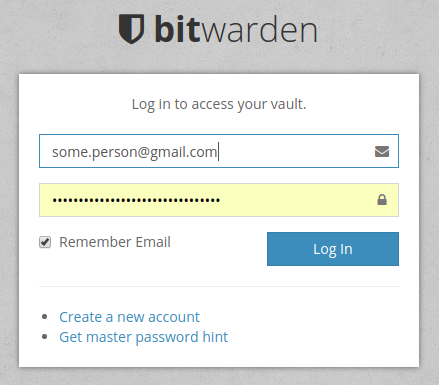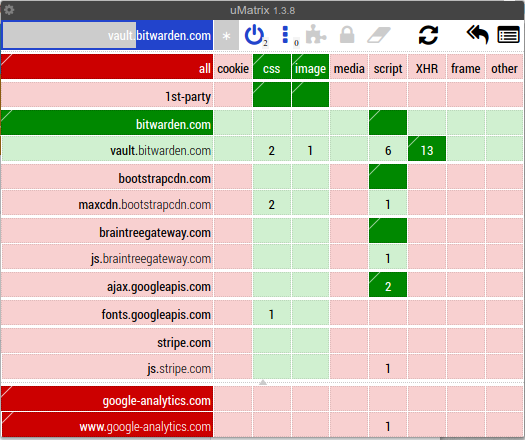A short security review of Bitwarden
Tuesday, May 1st, 2018
Update 2021-02-25: (Disclaimer: I’m not a cryptographer, and not affiliated or sponsored by Passbolt in any way, shape or form). I’ve reviewed another Open Source personal and team password manager called Passbolt. Without going into a full review, its security looks impressive. Passbolt uses plain, old, trusted GPG with asymmetric public / private key encryption to encrypt and share secrets. Secrets are end-to-end encrypted, and a separate browser plugin is used for the client-side encryption. This (apparently) makes the crypto safer than plain Javascript client-side encryption. (yada,, yada, CPRNG) This architecture is also more resilient against server-side breaches, as an attacker that gains access to the server cannot inject code into the javascript, given that it’s a separate plugin. The private key never leaves your client, as far as I can tell. The Open Source version does not support 2FA, however it already requires the private key and a password (with which the private key is encrypted). So basically it’s already 2FA by design. Passbolt is slightly less easier to use, but for team-based password sharing, I highly recommend it.
Update: Kyle Spearrin, the lead developer of Bitwarden, contacted me regarding this blog post. Some issues (unnecessary loading of resources from CDNs and disclosure of my email address to a third-party without confirmation) have already been resolved. Mitigations for other issues were already in place, although I haven’t had time to confirm this yet. I’ll update this post with more details as soon possible.
Bitwarden is an open source online password manager:
The easiest and safest way for individuals, teams, and business organizations to store, share, and sync sensitive data.
Bitwarden offers both a cloud hosted and on-premise version. Some notes on the scope of this blog post and disclaimers:
- I only looked at the cloud hosted version.
- This security review is not exhaustive, I only took about a few minutes to review various things.
- I’m not a security researcher, just a paranoid enthusiast. If you find anything wrong with this blog post, please contact me at ferry DOT boender (AT) gmaildotcom.
Here are my findings:
Encryption password sent over the wire
There appears to be no distinction between the authentication password and encryption password.

When logging in, the following HTTP POST is made to Bitwarden’s server:
client_id: web grant_type: password password: xFSJdHvKcrYQA0KAgOlhxBB3Bpsuanc7bZIKTpskiWk= scope: api offline_access username: some.person@gmail.com
That’s a base64 encoded password. (Don’t worry, I anonymized all secrets in this post, besides, it’s all throw-away passwords anyway). Lets see what it contains:
>>> import base64
>>> base64.b64decode('xFSJdHvKcrYQA0KAgOlhxBB3Bpsuanc7bZIKTpskiWk=')
b'p\x54\xde\x35\xb6\x90\x992\x63bKn\x7f\xfbb\xb2\x94t\x1b\xe9f\xez\xeaz}e\x142X#\xbd\x1c'
Okay, at least that’s not my plain text password. It is encoded, hashed or encrypted somehow, but I’m not sure how. Still, it makes me nervous that my password is being sent over the wire. The master password used for encryption should never leave a device, in any form. I would have expected two password here perhaps. One for authentication and one for encryption.
The reason it was implemented this way is probably because of the “Organizations” feature, which lets you share passwords with other people. Sharing secrets among people is probably hard to do in a secure way. I’m no cryptography expert, but there are probably ways to do this more securely using asymmetric encryption (public and private keys), which Bitwarden doesn’t appear to be using.
Bitwarden has a FAQ entry about its use of encryption, which claims that passwords are never sent over the wire unencrypted or unhashed:
Bitwarden always encrypts and/or hashes your data on your local device before it is ever sent to the cloud servers for syncing. The Bitwarden servers are only used for storing encrypted data. It is not possible to get your unencrypted data from the Bitwarden cloud servers.
The FAQ entry on hashing is also relevant:
Bitwarden salts and hashes your master password with your email address on the client (your computer/device) before it is transmitted to our servers. Once the server receives the hashed password from your computer/device it is then salted again with a cryptographically secure random value, hashed again and stored in our database. This process is repeated and hashes are compared every time you log in.
The hashing functions that are used are one way hashes. This means that they cannot be reverse engineered by anyone at Bitwarden to reveal your true master password. In the hypothetical event that the Bitwarden servers were hacked and your data was leaked, the data would have no value to the hacker.
However, there’s a major caveat here which they don’t mention. All of the encryption is done client-side by Javascript loaded from various servers and CDNs. This means that an attacker who gains control over any of these servers (or man-in-the-middle’s them somehow) can inject any javascript they like, and obtain your password that way.
Indiscriminate allowance / loading of external resources
The good news is that Bitwarden uses Content-Security-Policy. The bad news is that it allows the loading of resources from a variety of untrusted sources. uMatrix shows the type of resources it’s trying to load from various sources:

Here’s what the Content-Security-Policy looks like:
content-security-policy:
default-src
'self';
script-src
'self'
'sha256-ryoU+5+IUZTuUyTElqkrQGBJXr1brEv6r2CA62WUw8w='
https://www.google-analytics.com
https://js.stripe.com
https://js.braintreegateway.com
https://www.paypalobjects.com
https://maxcdn.bootstrapcdn.com
https://ajax.googleapis.com;
style-src
'self'
'unsafe-inline'
https://maxcdn.bootstrapcdn.com
https://assets.braintreegateway.com
https://*.paypal.com
https://fonts.googleapis.com;
img-src
'self'
data:
https://icons.bitwarden.com
https://*.paypal.com
https://www.paypalobjects.com
https://q.stripe.com
https://haveibeenpwned.com
https://chart.googleapis.com
https://www.google-analytics.com;
font-src
'self'
https://maxcdn.bootstrapcdn.com
https://fonts.gstatic.com;
child-src
'self'
https://js.stripe.com
https://assets.braintreegateway.com
https://*.paypal.com
https://*.duosecurity.com;
frame-src
'self'
https://js.stripe.com
https://assets.braintreegateway.com
https://*.paypal.com
https://*.duosecurity.com;
Roughly translated, it allows indiscriminate loading and executing of scripts, css, web workers (background threads) and inclusion of framed content from a wide variety of untrusted sources such as CDNs, Paypal, Duosecurity, Braintreegateway, Google, etc. Some of these I know, some I don’t. Trust I have in none of them.
It would take too long to explain why this is a bad idea, but the gist of it is that the more resources you load and allow from different sources, the bigger the attack surface becomes. Perhaps these are perfectly secure (right now…), but an import part of security is the developers’ security mindset. Some of these resources could have easily been hosted on the same origin servers. Some of these resources should only be allowed to run from payment pages. It shows sloppy configuration of the Content-Security-Policy, namely site-wide configuration in the web server (probably) rather than being determined on an URL by URL basis.
The actual client-side encryption library is loaded from vault.bitwarden.com, which is good. However, the (possibility of) inclusion of scripts from other sources negates any security benefits of doing so.
The inclusion of Google analytics in a password manager is, in my opinion, inexcusable. It’s not required functionality for the application, so it shouldn’t be in there.
New password entry is sent securely
When adding a new authentication entry, the entry appears to be client-side encrypted in some way before sending it to the server:
{
"name": "2.eD4fFLYUWmM6sgVDSA9pTg==|SNzQjLitpA5K+6qrBwC7jw==|DlfVCnVdZA9+3oLej4FHSQwwdo/CbmHkL2TuwnfXAoI=",
"organizationId": null,
"fields": null,
"notes": null,
"favorite": false,
"login": {
"username": null,
"password": "2.o4IO/yzz6syip4UEaU4QpA==|LbCyLjAOHa3m2wopsqayYK9O7Q5aqnR8nltUgylwSOo=|6ajVAh0r9OaBs+NgLKrTd+j3LdBLKBUbs/q8SE6XvUE=",
"totp": null
},
"folderId": null,
"type": 1
}
It’s base64 again, and decodes into the same obscure binary string as the password when logging in. I have not spent time looking at how exactly the encoding / encryption is happening, so I cannot claim that this is actually secure. So keep that in mind. It does give credence to Bitwarden’s claims that all sensitive data is encrypted client-side before sending it to the server.
Disclosure of my email address to a third part without my consent
I clicked on the “Data breach report” link on the left, and Bitwarden immediately sent my email address to https://haveibeenpwned.com. No confirmation, no nothing; it was disclosed to a third party immediately. Well, actually, since I use uMatrix to firewall my browser, it wasn’t and I had to explicitly allow it to do so, but even most security nerds don’t use uMatrix.

That’s not cool. Don’t disclose my info to third parties without my consent.
Developer mindset
One of, if not the, most important aspects is the developer mindset. That is, do they care about security and are they knowledgeable in the field?
Bitwarden appears to know what they’re doing. They have a security policy and run a bug bounty program. Security incidents appear to be solved quickly. I’d like to see more documentation on how the encryption, transfer and storage of secrets works. Right now, there are some FAQ entries, but it’s all promisses that give me no insight into where and how the applied security might break down.
One thing that bothers me is that they do not disclose any of the security trade-offs they made and how it impacts the security of your secrets. I’m always weary when claims of perfect security are made, whether explicitely, or by omission of information. There are obvious problems with client-side javascript encryption, which every developer and user with an reasonable understanding of web developers recognises. No mention of this is made. Instead, security concerns are waved away with “everything is encrypted on your device!”. That’s nice, but if attackers can control the code that does the encryption, all is lost.
Please note that I’m not saying that client-side javascript encryption is a bad decision! It’s a perfectly reasonable trade-off between the convenience of being able to access your secrets on all your devices and a more secure way of managing your passwords. However, this trade-off should be disclosed prominently to users.
Conclusion
So, is Bitwarden (Cloud) secure and should you use it? Unfortunately, I can’t give you any advice. It all depends on your requirements. All security is a tradeoff between usability, convenience and security.
I did this review because my organisation is looking into a self-hosted Open Source password manager to manage our organisation’s secrets. Would I use this to keep my personal passwords in? The answer is: no. I use an offline Keepass, which I manually sync from my laptop to my phone every now and then. This is still the most secure way of managing passwords that I do not need to share with anyone. However, that’s not the use-case that I reviewed Bitwarden for. So would I use it to manage our organisation’s secrets? Perhaps, the jury is still out on that. I’ll need to look at the self-hosted version to see if it also includes Javascript from unreliable sources. If so, I’d have to say that, no, I would not recommend Bitwarden.
